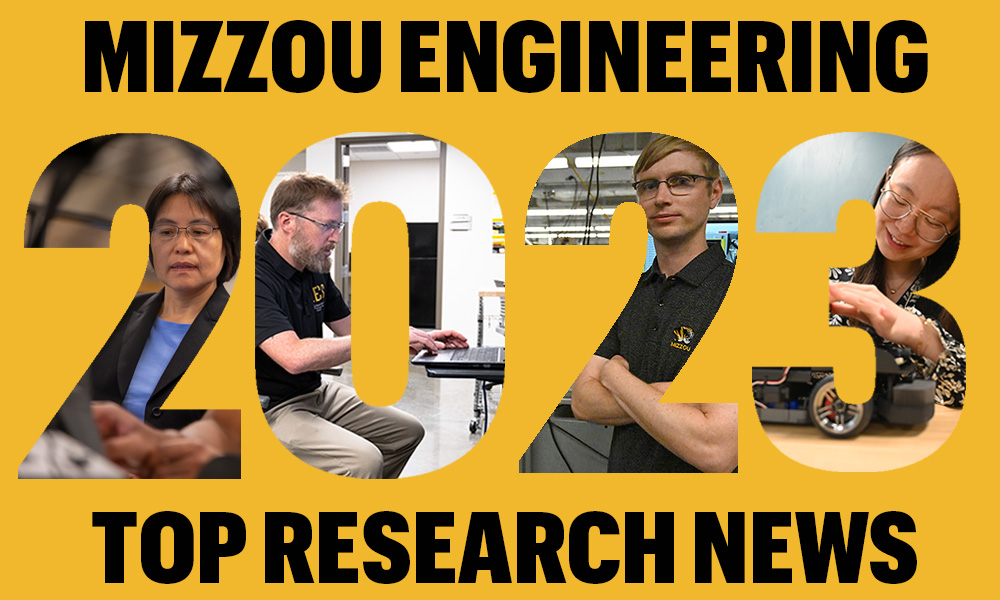December 21, 2023

This past year, Mizzou Engineers worked on solutions to society’s most-significant challenges. They advanced nuclear power. They studied ways to turn leftover bread crust into plastics that will degrade naturally in the environment. They made artificial intelligence explain itself. They invented new materials, investigated self-driving trucks and came up with an innovative system to optimize blood supplies.
“At Mizzou Engineering, we don’t just talk about big ideas—we make them a reality,” said Praveen Edara, interim dean. “We focus on the most-pressing problems and share our findings with industry, agencies and decision makers to implement solutions quickly and efficiently.”
Here are five areas Mizzou Engineering faculty advanced in 2023:
ENERGY/SUSTAINABILITY
Mizzou Engineers are coming up with sustainable solutions to rising energy demands. This past year, researchers advanced nuclear power, outlined a ground-breaking way to manufacture better and cheaper solid-state lighting and came up with techniques to turn food wastes and algae and carbon dioxide into biodegradable plastics.
Faculty improved wastewater treatment processes to cut greenhouse gas emissions and helped nuclear plants better monitor reactor coolant pumps. They made computer chips more energy efficient, used plastic waste in pavement mixtures and helped plants become more resilient to drought. Our researchers broke down so-called “forever” chemicals and studied the effects of hurricanes on water and sediment quality.
ADVANCES IN AI AND COMPUTING
Mizzou Engineering has been on the forefront of explainable artificial intelligence (AI) for years. And that focus on explainability is more important now than ever as generative AI takes over content creation. We are dedicated to ensuring AI evolves not only effectively but also ethically.
Our researchers also leveraged AI and machine learning for numerous applications—from tracking individual birds in flocks of water fowl and predicting the price of steel to helping news rooms sift through press releases and internet users find more specific videos. We developed realistic artificial data sets to train machines to predict vehicle crashes, improved algorithms for self-driving cars and predicted cybersickness using explainable AI in virtual goggles.
MATERIALS DISCOVERIES
We’re experts when it comes to development and advances in materials. In the MU Materials Science & Engineering Institute, researchers this past year were the first to provide direct evidence of a localized explosion of an aluminum nanoparticle and developed a technique to segment carbon nanotube forests in images. Mizzou Engineers created new metamaterials with 4D capabilities, essentially allowing waves to be controlled in the quantum realm, and developed a prototype metamaterial that uses electrical signals to control energy passing through solid material.
Work around polymers that can conduct electricity earned one researcher a National Science Foundation (NSF) CAREER Award this past year. And we received a $3 million grant from the NSF Research Traineeship program to establish a doctoral training program to prepare the next generation of material.
TRANSPORTATION
The establishment of the Missouri Work Zone Safety Center of Excellence in 2023 sealed our status as leaders when it comes to ensuring safe transportation through work zones across Missouri highways. But Mizzou Engineers have long been experts when it comes to preventing work zone injuries. This past year, our researchers continued to simulate work zones and other virtual transportation scenarios in our ZouSim Lab. They found that using self-driving trucks to follow a manned vehicle can reduce worker injuries in mobile work zones and developed an autonomous alarm system to warn drivers when they’re in danger of colliding with mobile work zones.
Our transportation experts in 2023 were recognized at the Transportation Research Board Annual Meeting in January and this fall presented work to industry and state partners at the Missouri Chamber of Commerce Transportation Future Summit and the Missouri Society of Professional Engineers.
HEALTH & WELLNESS
Mizzou Engineers continue to leverage the power of bioinformatics, circuitry, sensors and wearable technology to better diagnose and track health conditions. In January, one research team analyzed medical records from across the country to identify seven health symptoms of long COVID. Researchers developed skin-like materials to track vital signs, developed a new tool to advance discoveries in neuroscience and used EMG signals to assess movement in osteoarthritis patients. They outlined a system to customize blood supply solutions optimizing multiple criteria. And our researchers continue to lead the way in prediction models, developing software to predict protein location and generative AI models to predict protein function.
And Mizzou Engineering faculty continue to work alongside experts at the MU Research Reactor to develop breakthroughs in radioisotopes and advanced nuclear medicines.